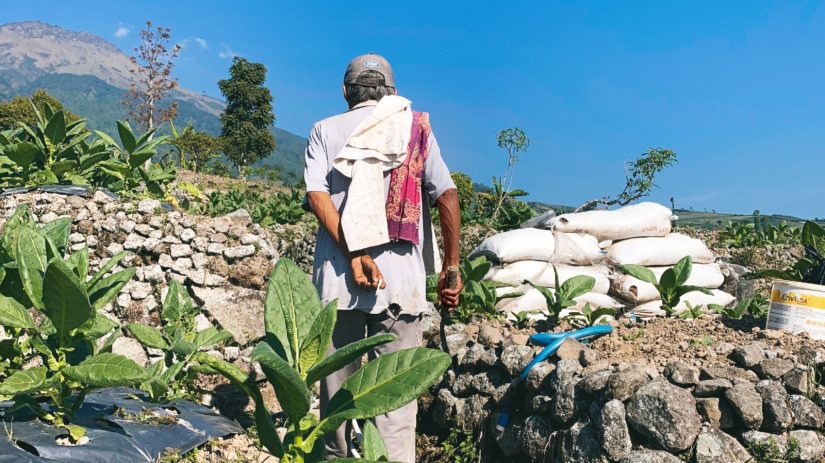
Tobacco is a very promising plantation commodity. In the form of cigarette excise, tobacco contributes more than 100 trillion rupiah in national income. However, the welfare of tobacco farmers as producers of cigarette raw materials is not proportional to their contribution. Despite this, farmers continue to farm tobacco despite the availability of other alternative agricultural commodities. In Temanggung Regency, which is nicknamed the Tobacco City, the situation is not much different. Local farmers have the opposite perception of tobacco. Among the local community, myths circulate that tobacco can bring high welfare to farmers, so it is called “green gold”, the plant of the “saints”, and various ritual practices such as ngalap berkah (seeking blessings) in the process of planting and processing tobacco.
Starting from this social phenomenon, the UGM Student Creativity Programme (PKM) team in the field of Social Humanities Research consisting of Abdila (History 2020), Wahyu Lestariningsih (Cultural Anthropology 2020), Devina Savana Putri (Economics 2021), and Ana Fitro Tunnisa (Social Development and Welfare (2022) accompanied by Dr Hempri Suyatna, S.Sos., M.Si conducted research with the title “Between Poverty and Ngalap Berkah Myth: Contradictions in Perceptions of Welfare of Temanggung Tobacco Farmers.” To obtain data, the team conducted in-depth observations and interviews in Tlogomulyo Sub-district, Temanggung Regency, Central Java in two months, July and September 2023. The team also conducted historical data research, and social welfare data research at BPS and the Temanggung District Social Service, and completed a secondary literature review.
By combining ethnographic and historical approaches, it was found that the middlemen’s entrapment and the involvement of the Chinese in the region are a vital part of the formation of tobacco myths, such as those about Ki Ageng Makukuhan and Saudagar Dampu Awang who are well well-known (and even sacred) among local farmers. The team also found that farmers form an inverse perception of the reality of the tobacco economy. There are several unfavourable conditions in the tobacco economy including the unpredictable selling price of tobacco, the strong dependence on extreme weather to produce good tobacco and avoid crop failure, the cessation of fertiliser subsidies due to tobacco policy, and unhealthy capital with middlemen at 50% interest rate known as nglimolasi system (borrow 10 pay 15). However, farmers continue to grow tobacco hoping for abundant sustenance at the beginning of each planting year, pinning their hopes for life and the future of their children and grandchildren on tobacco, and showing an emotional-spiritual connection to tobacco that tobacco is more than just a commodity.
As a plant of the saints, tobacco is also a blessing so farmers’ steadfastness in all economic conditions and continuing to cultivate tobacco and treat tobacco with its own speciality is part of the spiritual-emotional attachment in an effort to seek blessings. In this behaviour, the team found three dimensions of the subjective well-being of Temanggung tobacco farmers, including the harmony dimension, the social relationship dimension, and the environmental dimension. The harmony dimension is obtained when, for example, farmers work together in traditional ceremonies. The social relationship dimension is fulfilled by the feeling of happiness when they can help each other during picking season, as well as the attitude of solidarity among fellow farmers to fight for common welfare in the tobacco trade during harvest season.
The subjective welfare of the environmental dimension, for example, is the belief that welfare comes from the environment, namely in the form of fertile land, as well as the belief that natural elements are considered as living entities that are more than humans, thus forming the culture of selamatan ceremonies for the earth. Although material/economic welfare has various obstacles, Temanggung tobacco farmers have another source of welfare, namely subjective welfare that creates happiness for tobacco farmers and resistance to various challenges.
Writer: Abdila (History 2020) and Devina (Economics 2021)

